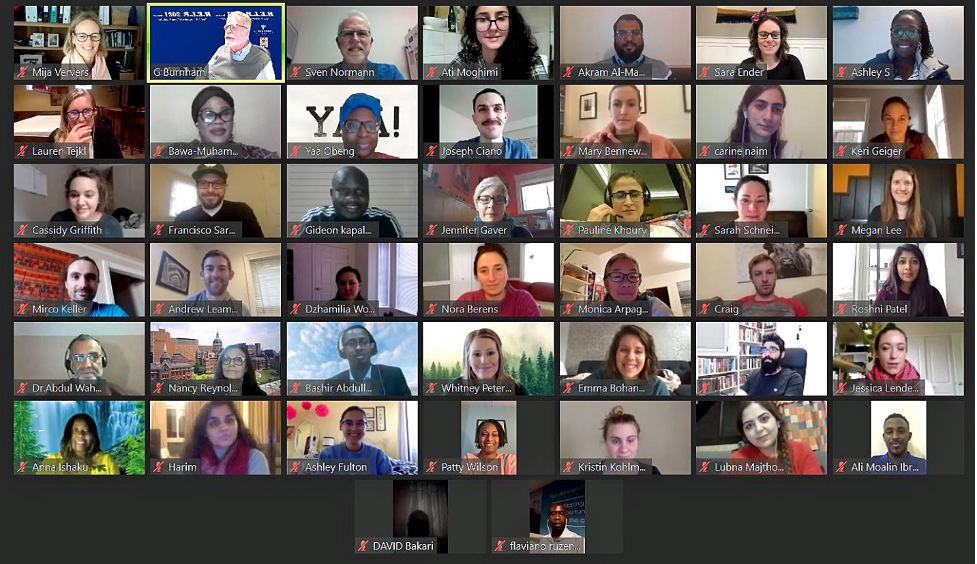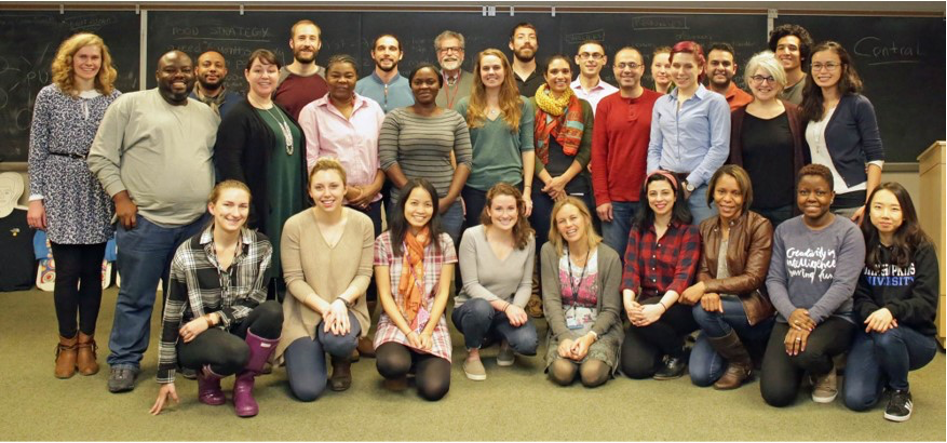HELP Course
Dates for H.E.L.P
Summer Institute (in-person): July 15-26, 2024
Winter Institute 2025: 6-17 January 2025
Application
APPLY NOW: SUMMER INSTITUTE APPLICATION 2024
Send an email to the HELP team for the Summer 2024 Application and further information about the HELP course, including the availability of limited, basic, and low-cost accommodations.
The Health Emergencies in Large Populations course is offered by the Johns Hopkins Bloomberg School of Public Health and for the January HELP course, the Johns Hopkins School of Nursing. For more than 25 years, the HELP course has offered humanitarian workers intensive training in the public health principles of disaster preparedness and disaster management. The course was founded to apply public health principles to the humanitarian needs of populations affected by disasters, both natural and conflict-related.
HELP participants come from a variety of civil society, governmental, and non-governmental organizations, and the Red Cross/Red Crescent Movement. Professions represented have included nurses, physicians, public health professionals, lawyers, journalists, managers, planners, logisticians, and aid workers. Some people attending have had many years of experience in specific areas of humanitarian assistance, and others are just beginning their careers.
The goal of HELP is to approach the needs of disaster-affected populations with a public health lens. The course will equip participants with the basic skills and competencies to enable them to respond to the public health needs of populations in humanitarian situations. Topics will be covered both through recorded modules prior to the course and live sessions which will build on the recorded materials.
Providing assistance begins with understanding the background, underlying causes, context, and current dynamics that cause populations to have health vulnerabilities in emergencies. Building on this, the course will include the topics listed below:
|
|
|
|
|
|
|
|
|
|
|
|
|
|
|
|
|
|
The 2-week workshop will also include a one-day simulation, during which acquired skills and knowledge can be applied.
At the completion of this course, participants will be able to:
Describe the essential issues related to public health, health care, management, law, and ethics that are associated with humanitarian action, and methods to address them.
Analyze health and other humanitarian needs using a multidisciplinary approach that takes into consideration the perceptions, vulnerabilities, and capabilities of the people affected.
Plan, manage, and evaluate activities in response to major humanitarian crises.
All healthcare and public health professionals working in health emergencies and humanitarian assistance will benefit from attending this workshop.
The virtual HELP workshop (January)
The virtual HELP workshop began during the pandemic using Zoom technology, and now will be offered every January (The Summer July HELP courses will be in person). The virtual workshop has the same structure and instructors as in the Baltimore on-site workshop. Group work continues to be an important part of the course.
A basic requirement is that all participants have adequate internet connectivity to actively participate through Zoom and to be able to view the PowerPoints and videos that are part of the workshop materials.
The January virtual HELP workshop has two parts, the online recorded (asynchronous) lectures to be completed in the 4 weeks before the virtual HELP workshop starts and the 2 weeks of attendance in the virtual (synchronous/’live’) HELP workshop.
Before the workshop, participants will complete a series of online preparatory class modules requiring approximately 10-12 hours and completed at their own pace. A quiz at the end of these modules will assure you that you have mastered the basic materials to begin the live virtual workshop through Zoom.
Participants must make time to complete the online recorded lectures before the virtual HELP workshop starts. During the interactive virtual live sessions, participants will participate in case studies, discussions, lectures, and exchange of experiences with colleagues, as well as apply the skills learned through the online courses. Problem-solving and group exercises will be done in group sessions. The virtual live part will require 6–6.5 hours of your full attention every day for both lectures and group work. In addition, it will take you 2–3 hours to prepare for the next day’s sessions. This is not a workshop to take while continuing your regular work. The virtual session in 2024 runs from 9:30 a.m.–4:00 p.m. on January 8-19 (U.S. Eastern time) to allow people from many time zones to participate. There will be breaks between the sessions, so you can have tea or coffee or grab a snack, and one longer (30 min) nutrition break.
The in-person HELP workshop (July)
Before arriving at JHU to attend the workshop, you must complete a series of online preparatory (asynchronous) class modules requiring approximately 10-12 hours and completed at your own pace, just like it is required for the virtual HELP workshop. A quiz at the end of these modules will assure you that you have mastered the basic materials to begin the in-person. Participants must make time to complete the online (asynchronous) recorded lectures before the in-person HELP workshop starts.
During the in-person workshop, participants will participate in case studies, discussions, lectures, and exchange of experiences with colleagues, as well as apply the skills learned through the online modules. Problem-solving and group exercises will be done in group sessions. The HELP workshop will require your full attention every day for both lectures and group work. This is not a workshop to take while continuing your regular work. The in-person session in 2024 runs from 9:00 a.m. – 5:30 p.m. on July 15-26.
A limited number of scholarships are available to cover some of the course fees for participants from low- and middle-income countries for both the virtual and the in-person courses. The scholarship does not cover transport costs to Baltimore. If interested, please request it when submitting your application.
Outline of Program
Course Fees & Scholarships
The HELP course is offered for 5 JHU credit hours. The costs for both academic credit and non-academic credit can be found on the JHU Summer Institute website: https://publichealth.jhu.edu/offices-and-services/office-of-admissions-services/tuition-and-fees listed as Health Emergencies in Large Populations. We are able to offer all non-credit applicants a scholarship of $1805. We ask all applicants to pay $150 with your application. There are a very small number of full scholarships available: A full scholarship entails that the HELP course fees will be only $150 and the balance of the fee will be waived. However, this will only be available for a few selected individuals in Low and Middle Income Countries. Please refer to the application for information about the full scholarship.
How to Apply?
- Send an email to the HELP Course Coordination Team at helpcourse.jhsph@gmail.com expressing your interest in the Summer 2024 course.
- The HELP course team will provide the 2024 application and further information about the summer course.
- Complete the application.
- Submit the completed application to the HELP team via email.
Contact the HELP Course Coordination Team if you have any questions not covered on the website.
Accolades from Recent Participants
All of the instructors were extremely impressive and I appreciated their diverse professional backgrounds in field medicine, food security/nutrition, and others.
The instructors were wonderful. I loved the enthusiasm and knowledge, and wide array of experience.
I want to reiterate my appreciation for the incredible HELP Course. The course exceeded my expectations and I feel much more prepared and knowledgeable about public health in emergencies and am looking forward to applying all that I learned to my professional career.
It was one of the best courses I have ever taken, even because during the HELP course, we learned a lot from knowledgeable and experienced experts, the course is full of practical cases and brainstorming, the simulation was amazing and you have the chance to meet people from around the world and learn from different intervention environments.
The course is very helpful as well as a country like Nepal, which is very prone to natural disasters, this course will help us to be ready for any kind of disaster.
I have gained more experience and lots of knowledge from the scenarios provided by senior lectures at JHSPH which makes me an ideal person now to contribute to the development of my country.
Thanks to all the facilitators for their brilliant insight and rich teaching.


Back to Top




